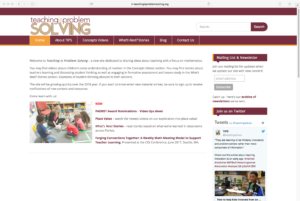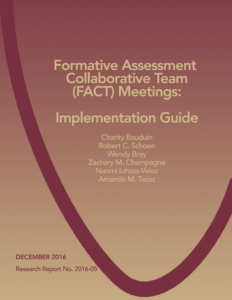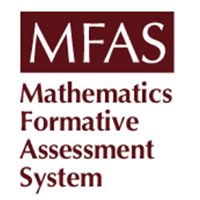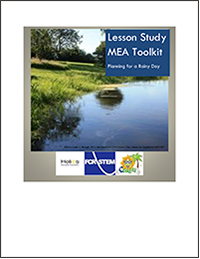Teaching and Learning
 TiPS is dedicated to sharing ideas about teaching with a focus on mathematics. This section provides links to resources designed to support teaching and learning of mathematics.
TiPS is dedicated to sharing ideas about teaching with a focus on mathematics. This section provides links to resources designed to support teaching and learning of mathematics.
Counting and Cardinality
Place Value Concepts
What’s Next? Stories
Teaching is Problem Solving Blog
CGI Stories
 The structured FACT meeting protocol involves weekly meetings of teachers who teach similar content. The meetings are led by an external facilitator. They are designed to focus teachers’ attention on the cognitive processes of students as they draw inferences about student understanding of mathematical topics and to support teachers in making instructional decisions based on what they learn about their own students. The development of the FACT meeting process and protocol was guided by previous research involving similar types of collaborative inquiry in regularly scheduled meetings of school-based instructional personnel (Gallimore et al., 2009; Gersten et al., 2010; Lang et al., 2011; Lang et al., 2014; Lang et al., 2013; Saunders et al., 2009; Supovitz, 2002). Studies conducted by Lang et al. (2014) and Gallimore et al. (2009) found that student achievement may increase when teams of teachers who teach similar content use an inquiry-based, structured protocol in regularly scheduled instructional team meetings. Gallimore et al. argued that teacher attributions shifted once teachers started focusing on learning goals and tracking progress. Saunders et al. (2009) noted that time for teachers to collaborate by itself is unlikely to improve achievement unless structured conditions are in place. This report contains guidance and supporting documents for implementing weekly FACT meetings. These meetings were implemented with more than 30 teams of teachers in six Florida school districts during the 2015–16 and 2016–17 school years.
The structured FACT meeting protocol involves weekly meetings of teachers who teach similar content. The meetings are led by an external facilitator. They are designed to focus teachers’ attention on the cognitive processes of students as they draw inferences about student understanding of mathematical topics and to support teachers in making instructional decisions based on what they learn about their own students. The development of the FACT meeting process and protocol was guided by previous research involving similar types of collaborative inquiry in regularly scheduled meetings of school-based instructional personnel (Gallimore et al., 2009; Gersten et al., 2010; Lang et al., 2011; Lang et al., 2014; Lang et al., 2013; Saunders et al., 2009; Supovitz, 2002). Studies conducted by Lang et al. (2014) and Gallimore et al. (2009) found that student achievement may increase when teams of teachers who teach similar content use an inquiry-based, structured protocol in regularly scheduled instructional team meetings. Gallimore et al. argued that teacher attributions shifted once teachers started focusing on learning goals and tracking progress. Saunders et al. (2009) noted that time for teachers to collaborate by itself is unlikely to improve achievement unless structured conditions are in place. This report contains guidance and supporting documents for implementing weekly FACT meetings. These meetings were implemented with more than 30 teams of teachers in six Florida school districts during the 2015–16 and 2016–17 school years.
 Florida’s Mathematics Formative Assessment System (MFAS) contains mathematics tasks aligned with every standard in the Mathematics Florida Standards for grades K–8 as well as the high school Algebra I and Geometry courses. The tasks are designed to be used during classroom instruction to provide teachers with information about students that can be used to guide day-to-day and moment-to-moment instructional decisions. A rubric designed to support formative assessment accompanies each task. In addition to tasks and rubrics, MFAS provides online professional development modules. These resources are available free-of-charge at CPALMS.
Florida’s Mathematics Formative Assessment System (MFAS) contains mathematics tasks aligned with every standard in the Mathematics Florida Standards for grades K–8 as well as the high school Algebra I and Geometry courses. The tasks are designed to be used during classroom instruction to provide teachers with information about students that can be used to guide day-to-day and moment-to-moment instructional decisions. A rubric designed to support formative assessment accompanies each task. In addition to tasks and rubrics, MFAS provides online professional development modules. These resources are available free-of-charge at CPALMS.
 This toolkit supports the development of an instructional unit on water quality that aligns with science, mathematics and English/Language Arts standards for students in grades 6 and 7. The elements of this toolkit were assembled based upon their suitability for constructing a multi-day instructional unit on water quality that corresponds with the 5E Learning Cycle of engage, explore, explain, elaborate, and evaluate. At the heart of this toolkit is a Model Eliciting Activity (MEA).
This toolkit supports the development of an instructional unit on water quality that aligns with science, mathematics and English/Language Arts standards for students in grades 6 and 7. The elements of this toolkit were assembled based upon their suitability for constructing a multi-day instructional unit on water quality that corresponds with the 5E Learning Cycle of engage, explore, explain, elaborate, and evaluate. At the heart of this toolkit is a Model Eliciting Activity (MEA).
